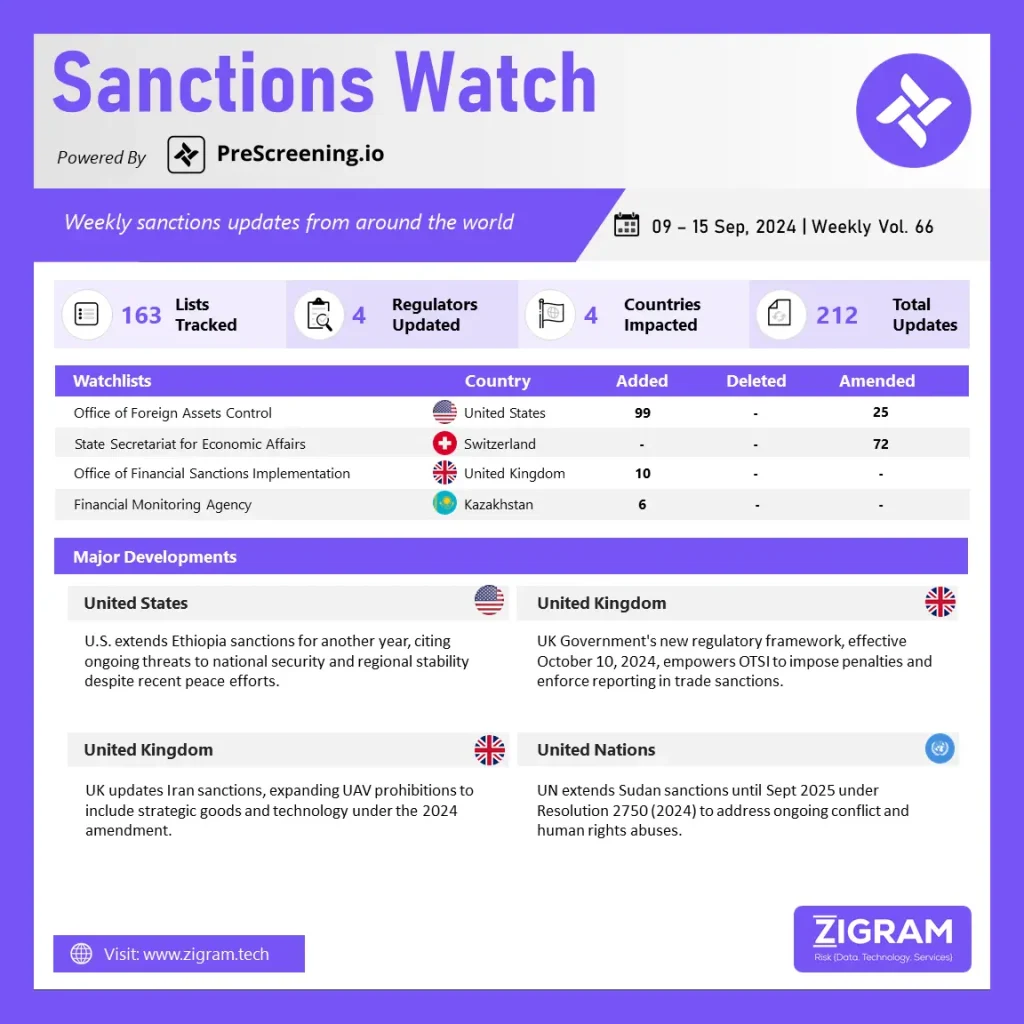Sanctions Watch Vol 66
In the latest edition of our Sanctions Watch weekly digest, we pressent significant updates on sanction watchlists and regulatory developments.
1. Biden Extends U.S. Sanctions On Ethiopia Amid Persistent Regional Instability
President Joe Biden has extended U.S. sanctions on individuals and groups linked to Ethiopia’s conflict, prolonging a national emergency order initially set to expire on September 17, 2024. The sanctions, authorized under Executive Order 14046, will remain in force for another year due to the ongoing threat to U.S. national security and foreign policy. Biden highlighted that the instability in northern Ethiopia and the broader Horn of Africa continues to jeopardize regional peace.
The extended sanctions target entities from Ethiopia, Eritrea, the Tigray People’s Liberation Front (TPLF), and the Amhara regional government, which are central to the conflict that emerged during the Tigray War. Despite a peace agreement signed in November 2022, violence has surged again, especially in the Amhara region, exacerbating the government’s challenges in achieving stability. The extension will be officially published in the Federal Register and sent to Congress.
2. UK Government Empowers OTSI For Trade Sanctions Enforcement
On 12 September 2024, the UK Government introduced the regulatory framework for the Office of Trade Sanctions Implementation (OTSI), which will oversee and enforce trade sanctions in the UK. Effective from 10 October 2024, the Trade, Aircraft and Shipping Sanctions (Civil Enforcement) Regulations 2024 grant OTSI the authority to impose civil monetary penalties for trade sanctions violations and mandate information disclosure, akin to the Office of Financial Sanctions Implementation (OFSI).
OTSI will focus on sanctions involving services, restricted goods, technology, and ancillary services. It will collaborate with HM Revenue and Customs (HMRC) on export controls and the Export Control Joint Unit (ECJU) on licensing. OTSI can impose penalties up to £1 million or 50% of the breach’s value and compel information disclosure, with penalties for non-compliance. Regulated sectors must report breaches, though legal privilege exceptions may apply.
3. UK Expands Iran Sanctions On Strategic Goods And Technology
The UK Government has implemented updates to the Iran sanctions regime with the Iran (Sanctions) (Amendment) Regulations 2024, which took effect on September 13, 2024. These amendments expand the scope of sanctions targeting unmanned aerial vehicles (UAVs) to now include goods and technology of strategic concern. This strategic focus includes specific technologies outlined in the updated regulations, such as software and advanced machinery.
The regulations aim to address the increased strategic threats posed by Iran in various sectors, including aerospace and technology. These changes were introduced to ensure compliance with the Sanctions and Anti-Money Laundering Act 2018 and to prevent the export and use of sensitive goods and technologies that could potentially contribute to Iran’s military capabilities. The amendment also introduces exceptions for personal effects and diplomatic purposes, further tightening the UK’s sanctions framework against Iran.
4. UN Extends Sanctions On Sudan For Peace Efforts.
The UN Security Council has unanimously extended sanctions against Sudan through Resolution 2750 (2024) until September 12, 2025. This resolution renews asset freezes, travel bans, and an arms embargo, aiming to address ongoing violence and human rights abuses in Darfur. The U.S. emphasized that the resolution signals international commitment to alleviating the crisis and advancing peace in Sudan.
The UK highlighted recent reports of human rights abuses and called for diplomatic efforts to end the conflict, while the Republic of Korea and China urged compliance with the arms embargo and targeted sanctions. France condemned all violations and urged against external support for warring parties, while Russia supported Sudanese government efforts to stabilize the region. Sudan’s representative condemned international actors, particularly the UAE, for exacerbating the crisis and called for targeted sanctions and increased humanitarian assistance.
Know more about the product: PreScreening.io
Click here to book a free demo.
Sanctions Watch is a weekly recap of events and news related to sanctions around the world.
- #UnitedStates
- #Ethiopia
- #NationalEmergency
- #NationalSecurity
- #RegionalPeace
- #TargetEntities
- # UnitedKingdom
- #TradeViolations
- #RestrictedGood
- #OTSI
- #ExportControlJointUnit
- #Penalties
- #UAVs
- #SanctionsWatch
- #InternationalSanctions
- #EconomicSanctions
- #RegulatoryCompliance
- #TradeCompliance
- #SanctionsEnforcement
- #SanctionsViolations
- #FinancialCrime
- #HumanitarianExemption
- #UnitedNations
- #AssetFreezes
- #TravelBans
- #ArmsEmbargo
- #HumanRightsAbuses
- #Sudan
- #China
